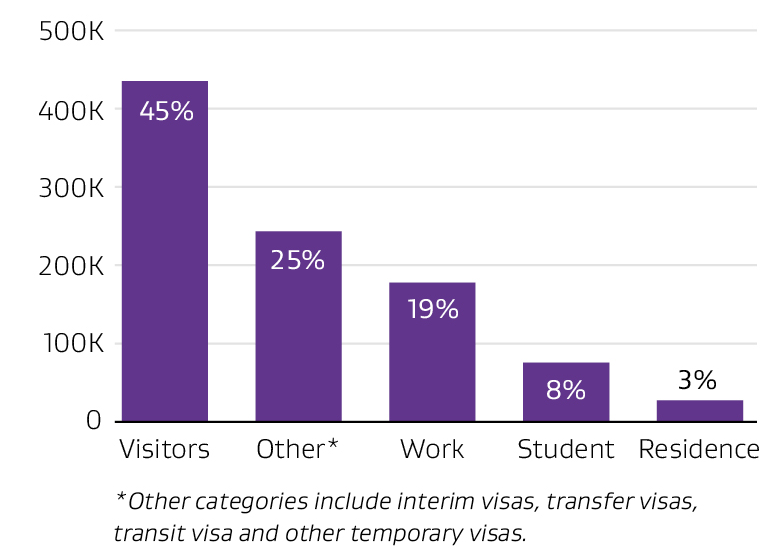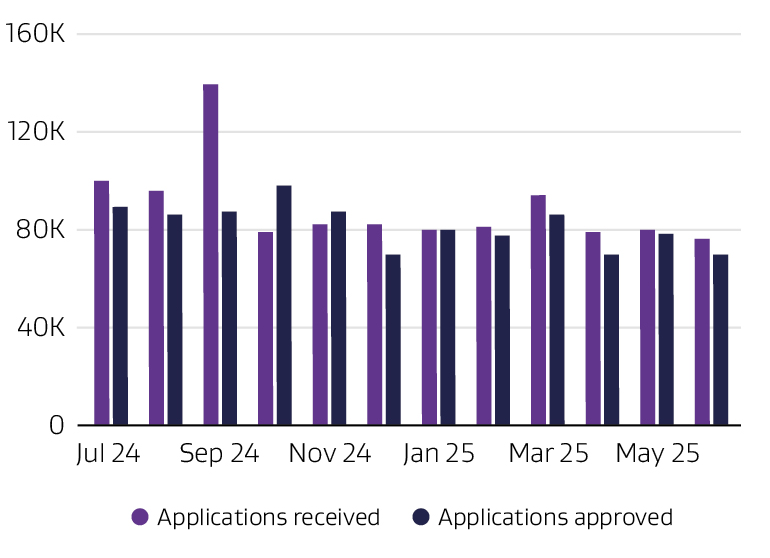Outcome 2: Skilled people engaged in safe and productive work
Skilled and productive labour and safe workplaces are essential attributes of long-term economic growth. A strong economy also needs the right mix of skills and labour supply to respond to global and domestic opportunities and shifts.
On this page I tēnei whārangi
What we are working towards
Businesses have access to the right labour and skills at the right time and an employment system that promotes the rights of workers and employers.
Expenditure
- Departmental: $679 million
- Non-departmental: $2,536 million
Ministerial portfolios
- Immigration
- Social Development and Employment
- Workplace Relations and Safety
- Accident Compensation Corporation
Agencies
- WorkSafe New Zealand
- Accident Compensation Corporation (ACC)
Core responsibilities
- Labour supply policy system
- Immigration settings
- Skilled labour development
- Workplace relations and dispute resolution
- Workplace safety
Key services
- New Zealand Immigration
- Employment New Zealand
- Larbour Inspectorate
2024/25 initiatives
- Immigration settings/visas for workers and residents
- Protection of worker
- Enabling a safe and productive work environment
- Employment relations and employment standards
Outcome measure trends
Key:
+ Positive shift
– Negative shift
= Unchanged
- – Employment
- + Skilled workforce
- = Migrant skills matching business needs
- + Migrant visa application experience
- + Pay equity
- + Fatal work-related injuries
- + Serious work-related injuries
Performance measures
Achieved 31/42
- Milestones 0/0
- Quality 6/9
- Satisfaction 7/8
- Timeliness 16/22
- Volume 2/3
Providing support for people to upgrade their skills enables them to do better socially and economically and increases their resilience. Under this outcome, we also make important contributions to 2 pillars of Going For Growth (Pillar 1: Developing talent and Pillar 2: Competitive business settings).
New Zealand’s immigration system
Immigration makes a vital contribution to New Zealand’s economy, workforce and community. It provides employers with access to important skills and capital, supports educational institutions in accessing international talent, reunites friends and families and contributes to New Zealand’s international and humanitarian commitments while maintaining the security and integrity of the border. MBIE supports the immigration system with policy development that helps shape the system through to delivery of core immigration services.
In addition, during 2024/25, we have been improving the quality of our service and visa processing times approved across all three visa categories (visitor, student and work). As well as an improvement in timeliness, we also saw an improvement in the quality of our decisions in both the temporary and residence categories, which resulted in an increase in customer satisfaction across the board.
The volume of work across the immigration system shows how integral immigration is to the country and the economy. In 2024/25:
- there were 3.6 million arrivals at the New Zealand border by non-New Zealand citizens
- over 500,000 visitor visa applications were decided, with an average processing time of 7 working days
- over 1.6 million New Zealand Electronic Travel Authority (NZeTA) requests were decided
- over 47,550 working holiday visa applications were decided
- 36,250 Accredited Employer Work Visa (AEWV) applications were decided, with processing speed improving significantly at various stages of the process
- over 22,200 employers became accredited or had their accreditation reviewed under the AEWV policy, bringing the number of current accredited employers to just over 24,200
- over 70,000 international student visas were decided, with the average processing time improving from 22 to 13 working days
- just over 1,500 refugees were able to call New Zealand home through New Zealand’s Refugee Quota Programme
- over 420 investigations into immigration breaches were opened, including investigations of over 210 cases with allegations of migrant exploitation
- over 1,250 deportations took place, the most since the border reopened in 2022.
Visa approvals by category

Growing the New Zealand labour market and attracting investment
MBIE works to understand the skill demand and supply in the New Zealand labour market. Working with others, we align options across education, employment and immigration, and provide data and analysis on developing economic and labour market trends.
This year, we supported the Government in implementing an ambitious policy work plan, including:
- changing the AEWV to better facilitate skilled migration and streamline settings for employers
- reviewing settings to broaden the residence setting for skilled and experienced migrants, particularly tradespeople and technicians
- returning open work rights to partners of high- skilled migrants
- refreshing the Active Investor Plus visa policy to attract more investor migrants to support New Zealand’s economic growth. In the three months since its launch, the Active Investor Plus Visa has surpassed $1 billion of committed investments, demonstrating its appeal to high-value investors worldwide
- revitalising the Recognised Seasonal Employers (RSE) Scheme, including improving the flexibility for workers under the scheme to move between employers and regions, and increasing the cap on the number of workers by 1,250 to 20,750 for the 2024/25 season
- establishing the new Parent Boost Visitor Visa to support parents to visit and stay with their families in New Zealand for longer.
Visa applications received and approved

International students
Over the past year, we have implemented initiatives to help facilitate student visa processing. We have done this while protecting the integrity of the immigration system, including through increasing visa processing capacity and encouraging students to submit good quality visa applications early. As a result, in 2024/25, we improved our processing time from 22 days on average in 2023/24 to 13 days. In 2024/25, we received over 71,400 international student visa applications compared with just over 66,900 in 2023/24.
Immigration New Zealand’s future services
Immigration New Zealand (INZ), the operational arm of New Zealand’s immigration system, is undergoing a multi-year customer-focused transformation programme that will include moving all visa products onto a single online platform following approval by the Government in February 2025.
By 2031, all visa applications will be processed online. When fully implemented, this is expected to save tens of millions of dollars in annual processing and operational costs. Previous product transitions, such as for Permanent Resident Visa applications, have already demonstrated consistent improvements in staff productivity. Customers will also find it easier to interact with us, for example, they will be able to check on their application status through an online portal, reducing the need to contact our service centre.
Protecting migrant workers
The AEWV is the main temporary work visa in New Zealand. It allows a migrant to work for an accredited employer for up to five years. It is designed to ensure New Zealanders are first in line for jobs and makes it easier for employers to hire skilled migrants where genuine skill or labour shortages exist.
This year between September and December 2024, INZ had a dedicated team focused on improving processing times (working days), managing risks and ensuring high-quality decisions. This led to significant improvements in processing and in average processing times.
| Accredited employer work visa steps | June 2025 | September 2024 |
|---|---|---|
| Accreditation applications | 2 working days | 44 working days |
| Job check | 3 working days | 45 working days |
| Work visas | 11 working days | 52 working days |
As at 30 June 2025, the total number of accredited employers was just over 24,200.
In April 2024, the Government also introduced a new infringement scheme to ensure fair treatment of migrant workers and improve compliance with immigration rules. The scheme enables MBIE to fine employers who commit immigration violations, such as employing people in breach of their visa conditions or employing a person unlawfully in New Zealand.
In its first year of operation, the scheme has resulted in 120 infringement notices issued to 118 employers, leading to $372,000 in penalties. The top three industries to receive the most infringements were construction, hospitality and the beauty industry.
Infringements also remove the ability of employers to hire migrants for a minimum of six months, depending on the number of infringement notices the employer receives. This helps tackle non-compliance more effectively and swiftly, ensuring employers are aware of their responsibilities when it comes to hiring migrants.
As part of our work to prevent and respond to migrant exploitation, when it does happen, and to enforce compliance with employment standards, we conduct investigations and progress prosecutions where appropriate.
This year, over 420 immigration investigation cases were opened, of these, over 210 were allegations of migrant exploitation and over 70 trafficking in persons. This year, four criminal prosecutions have been conducted along with an additional 132 individual actions spanning infringement notices, formal warnings and referrals to partner agencies. We assessed 96 per cent of reports of migrant exploitation within five days for eligibility for the migrant exploitation protection visa, to support workers to rapidly leave potentially exploitative situations.
Enabling a safe and productive work environment
We supported the Government’s agenda to enable more productive work environments, including:
- amending the Employment Relations Act 2000 to clarify contracting arrangements, simplify personal grievances, reduce complexity at the start of employment relationships and reintroduce the ability to make pay deductions in response to partial strikes
- amending the Equal Pay Act 1972 to make the process of raising and resolving pay equity claims more robust, workable and sustainable, including changing the process to raise and resolve claims of sex-based undervaluation in the pay of female-dominated work when a pay equity claim is made
- progressing the Holidays Act 2003 reforms, focusing on simplicity, improving workability and reducing compliance costs
- leading system-wide reforms of health and safety at work law and regulations. This included nationwide consultations, changes to legislation, and new expectations for WorkSafe performance to reduce unnecessary costs for businesses, increase certainty about what to do, and improve health and safety outcomes for businesses, workers and New Zealanders.
Employment relations and employment standards
MBIE provides dispute resolution services to support employers and employees to resolve problems, including early resolutions (a free, impartial phone- based service that helps resolve issues quickly and informally) and mediation. This year, in response to higher demand, we delivered 13.19% more dispute resolution interventions (over 23,800) across our certification of private records of settlement, early resolution and scheduled mediation services. We broadly maintained our customer satisfaction, with 82% of our customers rating our dispute resolution services as good or very good.
Employment Mediation Services provides a mediation service for any employee or employer with an employment relationship problem. This year, applications to Employment Mediation Services rose by 9.1%. Employers and employees sought our help to resolve work-related problems commonly involving dismissals, redundancies, restructuring and insolvencies, reflecting current economic and labour market conditions. The settlement rate for mediations was 66.2%, however, due to significant peaks in demand, wait times increased for scheduled mediation services over the second half of the year.
This year, a significant reduction occurred in reporting of employment standard concerns. Reporting of migrant exploitation also decreased significantly, with just over 2,700 reports this year, down 32% compared with last year. This is in line with the reduction in reporting of employment standards concerns. We delivered over 4,400 employment standards interventions, a 12% decrease on the previous year. Timeliness of investigations by the Labour Inspectorate continued to improve, with 92% completed in 12 months and 74% in 6 months.

